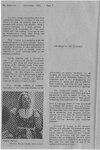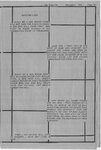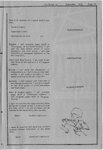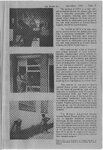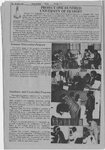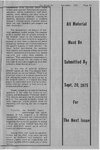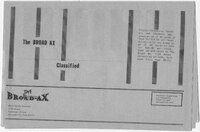| OCR Text |
Show 4 he Broad Ax The Upward UiSuatssochesuSensnseeennss Stason sensnins0QfUGQ0anutennqstosQuenQueeeauucesauuseenaueeeseeeanceeaueeenaueeesanineeeny Bound project at Luther College has taken its cue, for curriculum design from the principle that becoming a good student is not unlike becoming a good athlete. While in training athletes divide their time between drill sessions in which they master basic skills, and practice sessions in which they apply those skills. The academic counterparts of these activities in the Luther project are a two-hour skill-building session each morning (called Gore variety of content-specific in the afternoon. Group) and a academic courses Our experience this past summer suggests that the core group format is a highly effective one when supported by a system of performance contracting. Each staff member (both faculty and student tutors) serves as a supervisor for a core group of three or four students. These core groups meet for two hours each morning = for the purpose of building academic skills. = We have identified five skill areas that are = Paramount for academic achievement. They S are: 1) Reading 2) Writing 3) Listening 4) = Speaking and 5) Mathematics and Problem= Solving. Programmed _ instructional materials covering these skills are provided for each core group. Programmed materials have the = advantage of being administrable by non= specialists. Core group supervisors remain 2= with the group for the two-hour period each = morning. The functions of the supervisor are = to assist and encourage students when they = experience =to give difficulty them with the materials and positive reinforcement when = they demonstrate accomplishment. Core = group supervisors often supplement the = programmed materials with other learning = aids once they have determined individual = student interests. Core group supervisors are provided with =an analysis of each student’s proficiency sin the skill areas. =particular areas level These analyses.identify the in which a student needs =improvement. The -results of pre-program =Skill-assessment are interpreted for each Sstudent = request. by his/her supervisor at student Sometime before the beginning of each week a student negotiates with his/her supervisor for a formal contract which specifies the particular tasks which he/she will do during the week toward the improvement of skills. Something must be entered in the weekly contract for each of the five skill areas but the contract should emphasize the areas of greatest deficiency. Students work on their own during the ten hours (two hours each weekday) toward the completion of the tasks for which they have contracted. During the first weekly contract period the contracts normally specify amounts of time to be spent in each area. For example, under the Reading section of the contract an entry may read, ‘30 minutes per day working in the reading workbook.’’ After the first _week supervisors and students are better able to estimate individual capacities for achievement. Hence, for the second contract period an entry: may read, ‘‘Complete pages 36-56 in the reading workbook.’”’ Supervisors and students are expected to specify contract terms that are neither too difficult nor too simple. Contract terms must be challenging yet manageable. If they are not challenging the student will get bored, and if they are not manageable the student will experience frus- tration. The success of a _ performance contract system is contingent determination of a fine line. upon We found that most students took the contract system very seriously. Frequently students would ask to be excused from intramural activities in order to complete their contracts on time. At the end of the six-week period students and staff were asked to evaluate particular features of the program. Response to the core group component and the performance contract system was. almost universally positive. Under this system students were able to make remarkable gains in skill proficiency. More than 50% of the students in the program increased their vocabulary proficiency by more than one grade level (the Gates- McGinitie Reading Tests were used for preand post-testing). Gains in reading speed and accuracy were moderate. All but a few students increased their composite scores on math: some by as much as 30% in the six-week >eriod (the McGraw-Hill Basic Skills System sts were used). |





